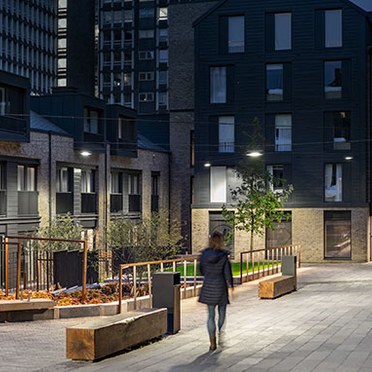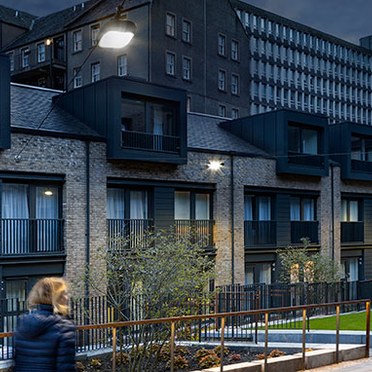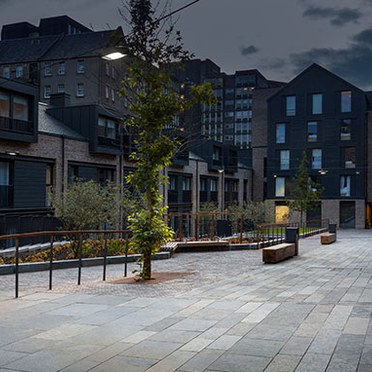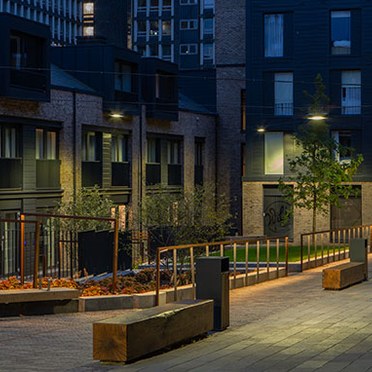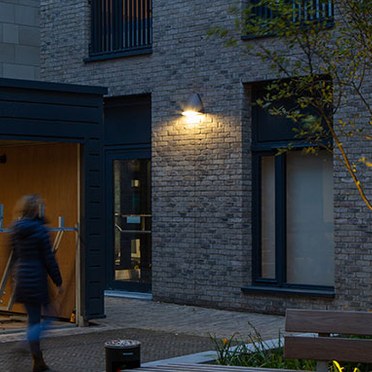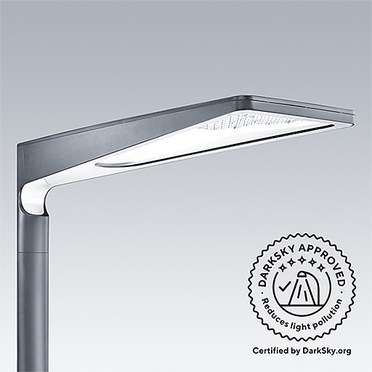Thorn’s versatile luminaires create well-lit spaces at King’s Stables Road
Products
- Lamp efficacy
Lamp efficacy
Ensuring the lamp efficiently converts electricity into light (lm/W).
- Ballast classification
Ballast classification
Controlling the electricity supply to the lamp (Energy Efficiency Index).
- Luminaire distribution
Luminaire distribution
Controlling light emission using optics which bend and shape the light to the correct location.
- System efficacy
System efficacy
Combining optical and thermal control within the luminaire (luminaire lm/W).
- Presence/absence detection
Presence/absence detection
Presence: Lights automatically turn on/off with movement. Absence: Lights automatically turn off and must be manually switched on.
- Daylight detection
Daylight detection
Artificial lighting which responds to the natural light conditions.
- Constant illuminance
Constant illuminance
A function designed to produce correct light levels for the duration of the maintenance period.
- Task-scene setting
Task-scene setting
Allowing the user to set scenes and adapt the lighting to different tasks.
- Timed off
Timed off
Automatic cut-off can be installed to turn all lights off during unoccupied hours.
- Task lighting
Task lighting
Lighting task areas with the correct amount of light.
- Zoning of lighting
Zoning of lighting
Lighting is zoned according to area use.
- Maintenance schedule
Maintenance schedule
Maintenance must be performed in response to product age, performance and environment.
- Waste light
Waste light
Eliminating waste light which does not hit the intended target.
- Reflectance
Reflectance
Taking advantage of light which is reflected from the surface within the space.
- Visible smart metering
Visible smart metering
Results of actions can be quickly seen as increased or decreased energy use to encourage responsible energy consumption.
Thorn Lighting has provided the external illumination for King’s Stables Road, a leading example of a successful mixed-use development in the historic city centre of Edinburgh. The chosen lighting solution includes various Urba fittings and Piazza bulkheads that blend sympathetically with the surrounding architecture.
The comprehensive redevelopment of the former council depot and an adjacent nightclub has wholly redefined a forgotten corner of the city, creating a vibrant and culturally significant quarter of Scotland’s capital. The completed development comprises of a 7-storey apartment block, a premium student accommodation scheme that includes a private roof terrace, a 4* apart-hotel that breaks down in scale to offer a series of studio apartments, garden flats and townhouses, four ground floor units which offer over 5700 sq. ft. of commercial space, all set around a series of public and semi-private courtyards.
Thorn’s Urba is a range of contemporary, economic, innovative and versatile luminaires that respects both the environment and the surroundings whilst providing an improved quality of light. The minimalist styling and clean lines with an original light signature brings more visual comfort and welcoming ambience. Urba wall mounted versions have been installed and Urba units with through wiring for the Catenary which offers unparalleled flexibility for the project. This has meant that the light can be placed exactly where it is needed, even if there is no support structure close by, reducing the intensity, light spill and energy consumption, whilst at the same time creating open and well-lit spaces. King’s Stables Road is the first catenary lighting scheme to be installed in the city of Edinburgh.
Thorn’s precision-designed LED bulkhead Piazza II LED has also been installed to put illumination precisely where it is required and nowhere else, due to its precise directional LED light source and optimal light distribution with a minimal upward light ratio of less than 2.5% (ULOR). Piazza II LED also provides an optimal 3 metre forward light throw and a wide spread to either side of the fitting, allowing wide spacing of up to 12 metres.
Improved public realm gives occupants and the wider public the opportunity to weave their way through reopened historic closes and well-lit courtyards. This experience promotes greater connectivity and features elements of historical interpretation, a result of the regular community and stakeholder engagement, enhancing the development’s sense of place and underlining the importance of considered, sustainable urban design.
Liz Leech, senior landscape architect at HarrisonStevens commented “With a strong identity, embedded in the social and urban history of King’s Stables Road, this site now offers an active, animated and dynamic urban space. The lighting forms an intrinsic part of this: the courtyard is freed from the clutter of ground-mounted lighting and design features are highlighted – all in an environmentally sound manner”.

